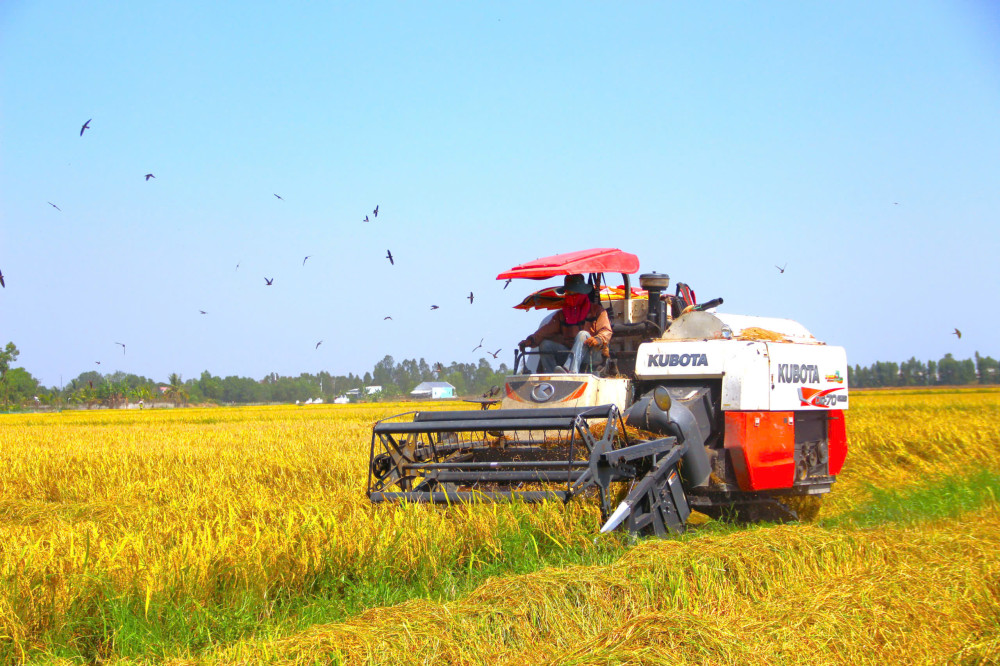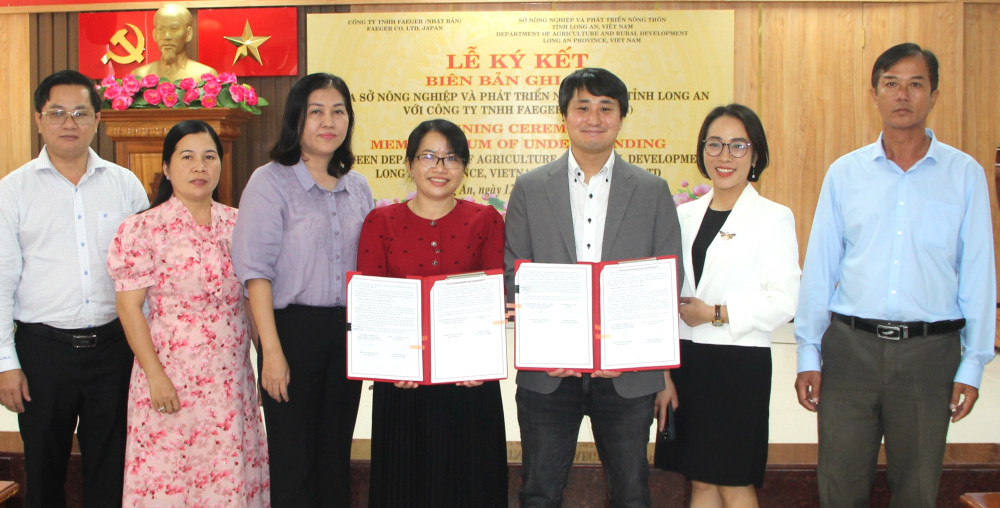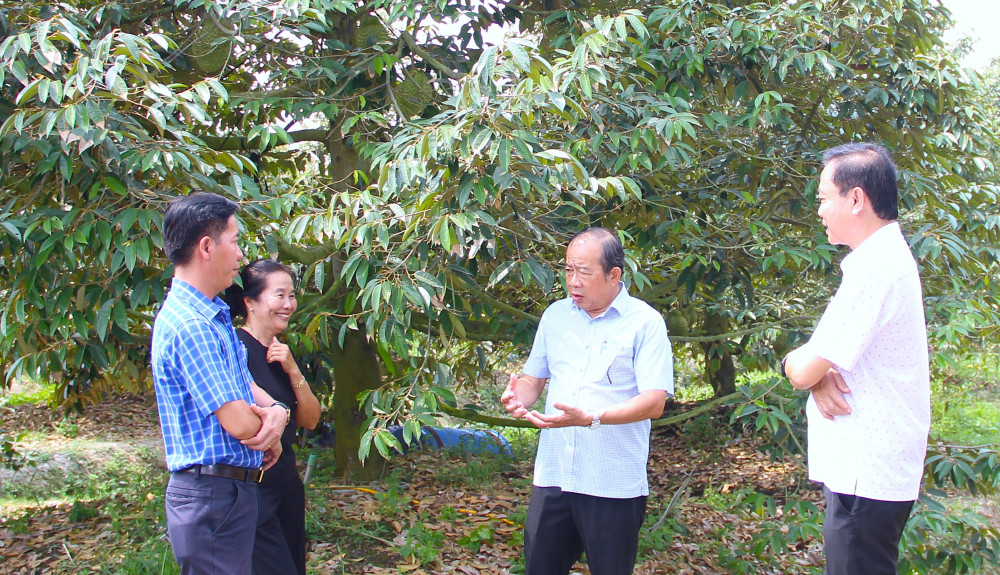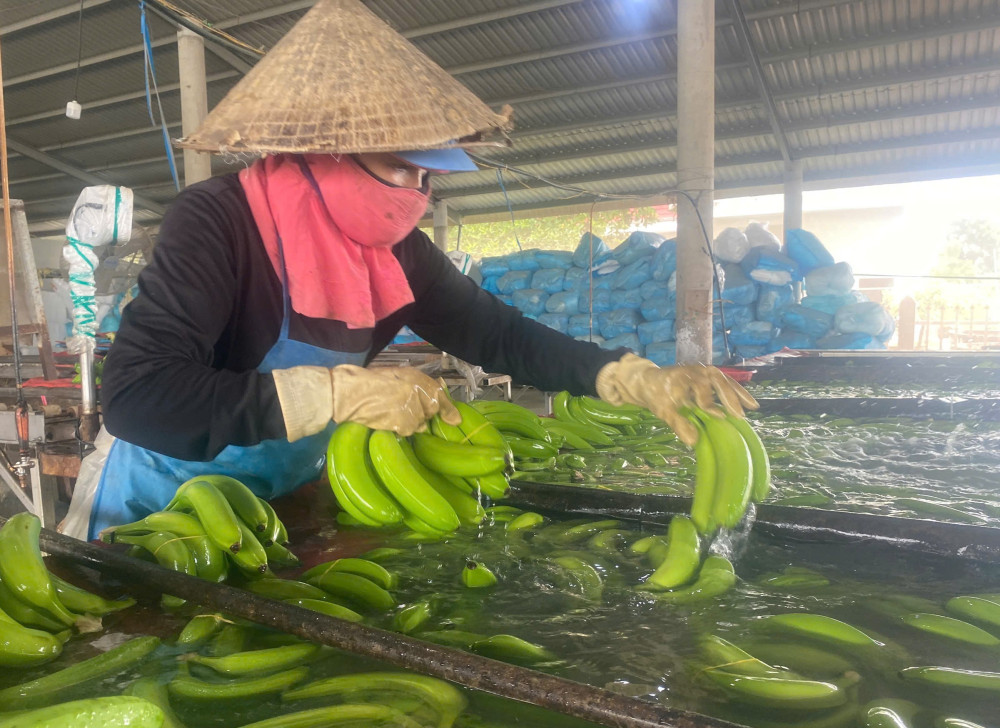
The provincial agricultural sector aims to form a specialized high-quality and low-emission rice growing area of 125,000 hectares by 2030
Coordinating high-quality rice production
Implementing the project "Sustainable development of 1 million hectares of high-quality and low-emission rice growing area associated with green growth in the Mekong Delta by 2030", the provincial agricultural sector aims to form a specialized high-quality and low-emission rice growing area of 125,000 hectares by 2030.
The sector aims to build a specialized high-quality and low-emission rice growing area associated with reorganizing the production system according to the value chain and applying sustainable farming processes to increase value, sustainably develop the rice industry, improve production efficiency, business, income and life of rice growers, protect the environment, adapt to climate change and reduce greenhouse gas emissions, contributing to the implementation of Vietnam's international commitments.
According to the Deputy Director of the Department of Agriculture and Rural Development - Dinh Thi Phuong Khanh, in order to contribute to the completion of the set goals and orientations, in early September 2024, the Department signed a memorandum of understanding with Faeger Company Limited (Japan) on cooperation in implementing and piloting carbon certification models from rice production using the alternate wetting and drying method (AWD) in the province.

The Department of Agriculture and Rural Development signs a memorandum of understanding with Faeger Co., Ltd. (Japan) on cooperation in implementing and piloting carbon certification models from rice production using the alternate wetting and drying method in the province
Accordingly, the two sides will cooperate to support farmers in sustainable agricultural production, reduce greenhouse gas emissions and implement green transformation in the agricultural sector; promote plans and projects in the agricultural sector to reduce greenhouse gas emissions in the province.
“Faeger Co. Ltd. is responsible for implementing, providing professional and technical support, and monitoring carbon certification models from rice production using the AWD method; bearing the costs incurred when testing the model, such as the cost of paying farmers to participate and hiring related services, purchasing raw materials, equipment necessary for testing, and compensation costs for farmers who lose profits when conducting the tests. The Department of Agriculture and Rural Development is responsible for ensuring infrastructure, assigning technical staff to coordinate and connect farmers in the region to implement together" - Ms. Dinh Thi Phuong Khanh informed.
According to the plan, in 2024, Faeger Company Limited coordinates with the Department of Agriculture and Rural Development to deploy and implement 2 pilot models at the Hoa Phu Agricultural Research and Service Center (Chau Thanh district) and 1 farmer household in Vinh Tri commune (Vinh Hung district), with the area of each model being 0.5 hectare. The goal by 2030 is to support farmers in the province to collect carbon credits on 100,000 hectares of rice applying the AWD method.
Before signing the memorandum of understanding with the Department of Agriculture and Rural Development, Faeger Co. Ltd. also signed a memorandum of understanding with the National Agricultural Extension Center to collaborate in implementing projects and testing throughout the entire region in Vietnam.
Tightening growing area codes for agricultural product exports
Determining that the development of growing area codes and packing facility codes plays an important role in improving the quality and value of agricultural products in the domestic market as well as serving exports, in recent times, the provincial Department of Agriculture has actively supported enterprises, cooperatives, and farmers to develop growing area codes on key agricultural products of the province such as dragon fruit, durian, lime, etc.
To date, the province has 294 growing area codes with a total area of 14,121.95 hectares exported to the following markets: Korea, Japan, the United States, Australia, New Zealand, Europe, Russia, the United Kingdom, and China. Of which, dragon fruit has 229 codes, lemons have 41 codes, watermelons have 13 codes, durians have 5 codes, mangoes have 2 codes, bananas have 2 codes, sweet potatoes have 1 code, and jackfruits have 1 code. In addition, the province also has 161 packing facility codes for agricultural products such as dragon fruit, lime, banana, jackfruit, mango, etc.
In addition, the province has 11 growing area codes that have completed their dossiers and sent them to the Plant Protection Department but have not been granted for the following products: lime, durian, sweet potato; 1 growing area code for durian has been inspected online by the General Department of Customs of China, has a report on corrections and is waiting for results.
With 1.5 hectares of durian granted growing area code, Mr. Ho Minh Chi (Truong Cong Y hamlet, Tan Lap commune, Tan Thanh district) can sell durian conveniently and at a higher price. "Thanks to growing area code, it is easier to connect with purchasing companies, helping my family stabilize the output of agricultural products, avoid the situation of being forced to lower prices by traders every time the harvest season comes" - Mr. Chi said.

The provincial Department of Agriculture surveys the code for durian growing areas in Tan Thanh district
However, in the process of implementing and managing growing area code and packing facility code, there are still some difficulties such as farmers' awareness of management, maintenance of conditions and regulations for growing areas; inspection, supervision, placement and management of fruit fly traps have not been done well; lacks of awareness in collecting used pesticide and fertilizer packaging; etc.
Along with that, recently there have been many shipments of agricultural products (dragon fruit, bananas, durian, jackfruit) that have violated plant quarantine. This affects the reputation of the province's agricultural products in particular and Vietnamese agricultural products in general. At the same time, it poses great challenges in managing growing area code and packing facility code. If violations occur continuously, it can push Vietnam's important agricultural export industries to the risk of losing their markets.

The whole province has 2 codes for banana growing areas for export
Head of the Department of Cultivation, Plant Protection and Agricultural Product Quality Management of the province - Nguyen Van Cuong said: “Currently, the requirements for growing area code and packing facility code to trace the origin are of interest, but there is a lack of staff to monitor the growing areas; people and facilities have not implemented well or have not followed the regulations; etc.
Therefore, in the coming time, the provincial Department of Agriculture will promote the development of growing area code; tighten the management and supervision of growing areas; strengthen the training and guidance to raise awareness for organizations and individuals about regulations as well as technical solutions, periodically monitor growing areas and packaging facilities that have been granted code in accordance with the instructions and regulations of the importing country”./.
By Minh Tue - Translated by Q. Thien
Source: https://baolongan.vn/tung-buoc-nang-cao-va-chuan-hoa-chat-luong-nong-san-a185055.html
 Digital promotions reshape Vietnam’s e-commerce race
Digital promotions reshape Vietnam’s e-commerce race






